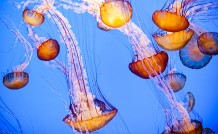Online Class: Introduction to Microbiology
This course is a basic overview of microbiology concepts.
COURSE CLOSED
We're sorry, this course is no longer open for enrollment.
We're sorry, this course is no longer open for enrollment.
-
23Lessons
-
68Exams &
Assignments -
30Hours
average time -
3.0CEUs
Course Description
This course is a basic overview of microbiology concepts. It is geared towards the casual learner learning about the foundational concepts of microbiology.
- Completely Online
- Self-Paced
- 6 Months to Complete
- 24/7 Availability
- Start Anytime
- PC & Mac Compatible
- Android & iOS Friendly
- Accredited CEUs

Course Lessons
Lesson 1: Introduction to Microbiology
Microbiology is defined as the branch of biology focused on microorganisms and the effects they have on other living organisms.
Additional lesson topics: Great Microbiologists
80 Total Points
 Lesson 1 Video
Lesson 1 Video Lesson discussions: And the Prize Goes To...; Reasons for Taking this Course
Lesson discussions: And the Prize Goes To...; Reasons for Taking this Course Complete: Lesson 1 Assignment 1: Who's Who in Microbiology
Complete: Lesson 1 Assignment 1: Who's Who in Microbiology Complete: Lesson 1 Assignment 2: Research Pays Off
Complete: Lesson 1 Assignment 2: Research Pays Off Assessment: Lesson 1 Exam
Assessment: Lesson 1 Exam
Lesson 2: The Microorganism
Now moving on to learning more about the varying forms in which microorganisms exist.
73 Total Points
 Lesson 2 Video
Lesson 2 Video Complete: Lesson 2 Assignment 1: Understand Microorganisms
Complete: Lesson 2 Assignment 1: Understand Microorganisms Complete: Lesson 2 Assignment 2: Pathogens Rule
Complete: Lesson 2 Assignment 2: Pathogens Rule Assessment: Lesson 2 Exam
Assessment: Lesson 2 Exam
Lesson 3: The Chemical Basis of Microbiology
In previous lessons, while we have gained insight to the different forms of microorganisms and their varying applications (both effective and harmful), we have not yet begun to understand their basic structure, manner of functioning, and genera
88 Total Points
 Lesson 3 Video
Lesson 3 Video Complete: Lesson 3 Assignment 1: Cell Bingo
Complete: Lesson 3 Assignment 1: Cell Bingo Complete: Lesson 3 Assignment 2: Center Stage
Complete: Lesson 3 Assignment 2: Center Stage Assessment: Lesson 3 Exam
Assessment: Lesson 3 Exam
Lesson 4: Prokaryotes and Eukaryotes
All cells have a cell membrane that separates the environs outside a cell from the degree of organization within the cell.
Additional lesson topics: Cellular Biology
68 Total Points
 Lesson 4 Video
Lesson 4 Video Complete: Lesson 4 Assignment 1: Carry the Oats!
Complete: Lesson 4 Assignment 1: Carry the Oats! Complete: Lesson 4 Assignment 2: Cellular Similarities
Complete: Lesson 4 Assignment 2: Cellular Similarities Assessment: Lesson 4 Exam
Assessment: Lesson 4 Exam
Lesson 5: Microbial Metabolism
One reason why the metabolism of microbes is an instrumental area of study is that it serves as a way of differentiating one species from another.
68 Total Points
 Lesson 5 Video
Lesson 5 Video Complete: Lesson 5 Assignment 1: Metabolism for Molecules
Complete: Lesson 5 Assignment 1: Metabolism for Molecules Complete: Lesson 5 Assignment 2: Energy Generator
Complete: Lesson 5 Assignment 2: Energy Generator Assessment: Lesson 5 Exam
Assessment: Lesson 5 Exam
Lesson 6: Microbial Growth and Control of Growth
In the last few lessons we have spent time learning about microorganisms, their nutritional needs, and the manner in which they utilize the energy they obtain.
70 Total Points
 Lesson 6 Video
Lesson 6 Video Complete: Lesson 6 Assignment 1: Microbial Control
Complete: Lesson 6 Assignment 1: Microbial Control Complete: Lesson 6 Assignment 2: What's Clean?
Complete: Lesson 6 Assignment 2: What's Clean? Assessment: Lesson 6 Exam
Assessment: Lesson 6 Exam
Lesson 7: Microbial Genetics
The contributions of microbial genetics to the science world, as well as, the world at large, have been extensive and, in many respects, pivotal to furthering significant studies.
90 Total Points
 Lesson 7 Video
Lesson 7 Video Complete: Lesson 7 Assignment 1: Ingredients Please
Complete: Lesson 7 Assignment 1: Ingredients Please Complete: Lesson 7 Assignment 2: Copy That
Complete: Lesson 7 Assignment 2: Copy That Assessment: Lesson 7 Exam
Assessment: Lesson 7 Exam
Lesson 8: DNA Technology
We are extending the discussion of genetic systems of microorganisms to the point where scientists are now able to manipulate the genetic make up of particular organisms for the benefit of modern day application
68 Total Points
 Lesson 8 Video
Lesson 8 Video Complete: Lesson 8 Assignment 1: Genetic Basics
Complete: Lesson 8 Assignment 1: Genetic Basics Complete: Lesson 8 Assignment 2: Do That Again
Complete: Lesson 8 Assignment 2: Do That Again Assessment: Lesson 8 Exam
Assessment: Lesson 8 Exam
Lesson 9: The Bacteria
As we have learned about bacteria from a very early age -- falling down and scraping our knee and having it treated with an antibacterial spray, we may think we know all we need to on the subject.
Additional lesson topics: Bacterial Ecosystems
80 Total Points
 Lesson 9 Video
Lesson 9 Video Complete: Lesson 9 Assignment 1: Identifying Bacteria
Complete: Lesson 9 Assignment 1: Identifying Bacteria Complete: Lesson 9 Assignment 2: Classifying Bacteria
Complete: Lesson 9 Assignment 2: Classifying Bacteria Assessment: Lesson 9 Exam
Assessment: Lesson 9 Exam
Lesson 10: 'V' for 'Virus'
Viruses are a means of transmitting genetic information in an effort to continue their survival. In order to accomplish their end goal, viruses act as agents which reproduce their own DNA/RNA within living cells.
96 Total Points
 Lesson 10 Video
Lesson 10 Video Complete: Lesson 10 Assignment 1: What is a Virus?
Complete: Lesson 10 Assignment 1: What is a Virus? Complete: Lesson 10 Assignment 2: Virus Life Cycle
Complete: Lesson 10 Assignment 2: Virus Life Cycle Assessment: Lesson 10 Exam
Assessment: Lesson 10 Exam
Lesson 11: The Algae, Fungi, Protozoa and Helminthes
The world of microorganisms is made of bacteria, fungi, algae, protozoa, and viruses. They are grouped together not by their function but by their small size.
78 Total Points
 Lesson 11 Video
Lesson 11 Video Complete: Lesson 11 Assignment 1: Microorganism Tag
Complete: Lesson 11 Assignment 1: Microorganism Tag Complete: Lesson 11 Assignment 2: Category Please?
Complete: Lesson 11 Assignment 2: Category Please? Assessment: Lesson 11 Exam
Assessment: Lesson 11 Exam
Lesson 12: The Development of Disease
To understand how diseases have evolved throughout the ages, we first need to have a basis for qualifying what indeed a disease is.
66 Total Points
 Lesson 12 Video
Lesson 12 Video Lesson discussions: Threats Everywhere
Lesson discussions: Threats Everywhere Complete: Lesson 12 Assignment 1: What is a disease?
Complete: Lesson 12 Assignment 1: What is a disease? Complete: Lesson 12 Assignment 2: Back Off!
Complete: Lesson 12 Assignment 2: Back Off! Assessment: Lesson 12 Exam
Assessment: Lesson 12 Exam
Lesson 13: The Immune System
In the previous lesson, we explored the world of disease- how diseases have become more endemic to society (known as epidemiology) and the methods utilized to help contain and eradicate them.
68 Total Points
 Lesson 13 Video
Lesson 13 Video Complete: Lesson 13 Assignment 1: Immunity Factors
Complete: Lesson 13 Assignment 1: Immunity Factors Complete: Lesson 13 Assignment 2: Body Guards
Complete: Lesson 13 Assignment 2: Body Guards Assessment: Lesson 13 Exam
Assessment: Lesson 13 Exam
Lesson 14: Disorders of the Immune System
All immune defense mechanisms can only take place in a healthy system where the immunity defenses are properly functioning.
108 Total Points
 Lesson 14 Video
Lesson 14 Video Complete: Lesson 14 Assignment 1: Immunity and Your Body
Complete: Lesson 14 Assignment 1: Immunity and Your Body Complete: Lesson 14 Assignment 2: Defensive Moves
Complete: Lesson 14 Assignment 2: Defensive Moves Assessment: Lesson 14 Exam
Assessment: Lesson 14 Exam
Lesson 15: Diseases of the Skin and Eye
The largest organ of the body, skin (in conjunction with mucous membranes) is designed to prohibit microorganisms from entering the body.
Additional lesson topics: Diseases of the Eye
90 Total Points
 Lesson 15 Video
Lesson 15 Video Complete: Lesson 15 Assignment 1: Viral Infections
Complete: Lesson 15 Assignment 1: Viral Infections Complete: Lesson 15 Assignment 2: The Eyes Have It
Complete: Lesson 15 Assignment 2: The Eyes Have It Assessment: Lesson 15 Exam
Assessment: Lesson 15 Exam
Lesson 16: Diseases of the Nervous System
Diseases of the central and peripheral nervous systems include all disorders that affect the brain, spinal cord, cranial nerves, peripheral nerves, nerve roots, autonomic nervous system, neuromuscular junction, and muscles.
74 Total Points
 Lesson 16 Video
Lesson 16 Video Complete: Lesson 16 Assignment 1: Meninges Mater
Complete: Lesson 16 Assignment 1: Meninges Mater Complete: Lesson 16 Assignment 2: Nervous?
Complete: Lesson 16 Assignment 2: Nervous? Assessment: Lesson 16 Exam
Assessment: Lesson 16 Exam
Lesson 17: Diseases of the Cardiovascular and Lymphatic Systems
By looking at the components of both the cardiovascular and lymphatic systems and how, respectively they each perform their core responsibilities, we can ascertain how ensuing diseases compromise their functioning.
68 Total Points
 Lesson 17 Video
Lesson 17 Video Complete: Lesson 17 Assignment 1: Take Your Pick
Complete: Lesson 17 Assignment 1: Take Your Pick Complete: Lesson 17 Assignment 2: Yellow Fever S&S
Complete: Lesson 17 Assignment 2: Yellow Fever S&S Assessment: Lesson 17 Exam
Assessment: Lesson 17 Exam
Lesson 18: Diseases of the Respiratory System
Moving from diseases affecting the cardiovascular and lymphatic systems to those pertinent to the respiratory system, we first attempt to gain a sense of what respiration is and how it functions in the body.
88 Total Points
 Lesson 18 Video
Lesson 18 Video Complete: Lesson 18 Assignment 1: Job Description
Complete: Lesson 18 Assignment 1: Job Description Complete: Lesson 18 Assignment 2: ATP Means Energy
Complete: Lesson 18 Assignment 2: ATP Means Energy Assessment: Lesson 18 Exam
Assessment: Lesson 18 Exam
Lesson 19: Diseases of the Digestive System
According to the food pyramid and collective wisdom, a diet based upon sound nutrition and a regular exercise program can alleviate many serious health problems down the road.
Additional lesson topics: Diverticulosis and Diverticulitis
108 Total Points
 Lesson 19 Video
Lesson 19 Video Complete: Lesson 19 Assignment 1: Danger Ahead
Complete: Lesson 19 Assignment 1: Danger Ahead Complete: Lesson 19 Assignment 2: Diver What?
Complete: Lesson 19 Assignment 2: Diver What? Assessment: Lesson 19 Exam
Assessment: Lesson 19 Exam
Lesson 20: Diseases of the Reproductive System
Species, in the general sense, all have a desire to ensure the survival of their kind. And, reproduction is the method by which they are able to accomplish the perpetuation of their genealogy/race.
90 Total Points
 Complete: Lesson 20 Assignment 1: Connections
Complete: Lesson 20 Assignment 1: Connections Complete: Lesson 20 Assignment 2: STD's
Complete: Lesson 20 Assignment 2: STD's Assessment: Lesson 20 Exam
Assessment: Lesson 20 Exam
Lesson 21: Vaccines
A vaccine is a form of an antigen (substance which stimulates an immune response) used to create a barrier of immunity against a specific disease.
70 Total Points
 Lesson 21 Video
Lesson 21 Video Lesson discussions: Do You Have What It Takes?
Lesson discussions: Do You Have What It Takes? Complete: Lesson 21 Assignment 1: This Shot's For You
Complete: Lesson 21 Assignment 1: This Shot's For You Complete: Lesson 21 Assignment 2: Who Are You?
Complete: Lesson 21 Assignment 2: Who Are You? Assessment: Lesson 21 Exam
Assessment: Lesson 21 Exam
Lesson 22: Exploring Antimicrobial Drugs
Eploring the world of antimicrobial drugs, it is helpful to define the term antimicrobial. Anti means 'against' and 'microbial', is an object which is not completely visible to the naked eye and
100 Total Points
 Lesson 22 Video
Lesson 22 Video Complete: Lesson 22 Assignment 1: Anti-What?
Complete: Lesson 22 Assignment 1: Anti-What? Complete: Lesson 22 Assignment 2: Antibiotic Know How
Complete: Lesson 22 Assignment 2: Antibiotic Know How Assessment: Lesson 22 Exam
Assessment: Lesson 22 Exam
Lesson 23: Conclusion
Some may believe that just because microbiology deals with small particles invisible to the naked eye, the impact of its studies and findings are not equally as important as larger bodied sciences, e.g., biology and nuclear physics.
70 Total Points
 Lesson 23 Video
Lesson 23 Video Lesson discussions: What do you think about this course?; Program Evaluation Follow-up Survey (End of Course); Course Comments
Lesson discussions: What do you think about this course?; Program Evaluation Follow-up Survey (End of Course); Course Comments Complete: Lesson 23 Assignment 1: Defining Microbiology
Complete: Lesson 23 Assignment 1: Defining Microbiology Complete: Lesson 23 Assignment 2: Bugs Everywhere
Complete: Lesson 23 Assignment 2: Bugs Everywhere
1859
Total Course Points
Learning Outcomes
By successfully completing this course, students will be able to:
- Define microbiology.
- Define the microorganism.
- Describe the chemical basis of microbiology.
- Describe prokaryotes and eukaryotes.
- Describe microbial metabolism and growth.
- Summarize microbial genetics and DNA technology.
- Describe bacteria and viruses.
- Describe the algae, fungi, protozoa and helminthes.
- Describe the immune system, disorders of the immune system, and the development of disease.
- Describe diseases of the skin and eye.
- Describe diseases of the nervous system.
- Describe diseases of the cardiovascular and lymphatic systems.
- Describe diseases of the respiratory, digestive, and reproductive systems.
- Describe diseases of the respiratory, digestive, and reproductive systems.
- Summarize vaccines and antimicrobial drugs.
- Demonstrate mastery of lesson content at levels of 70% or higher.
Student Testimonials
- "The course is so informative that adds my knowledge as a Laboratory Assistant. What I learned in this course was that it encourage me to pursue as a Laboratory Technician." -- Frank E.
- "It was great." -- Philip Z.
- "The instructer was very helpful when I contacted him on specific issues and returned our assignments promptly." -- Helen B.
- "I think everything begins with a good instructor and this class was a success, because he cared to explain and make sure that the student felt comfortable." -- Yolanda A.
- "James was very responsive and helpful to my questions." -- Kathy S.
- "Would return to take another course in the future." -- Daniel T.
- "Alot of useful information. Presented in an easy to read format, organized" -- Daniel T.
- "My instructor worked hard to keep me informed with his assessments of my assignments and exams." -- Tommy R.
- "Although I work in Bacteriology and have very limited knowledge of Biology I used this course to help me understand some of what I deal with daily. To me, all the materials were useful/helpful." -- Tommy R.
- "The whole structure of this course is so well organised that it has made my learning easy as well as interesting! A Great program!" -- Irene C.
Related Courses
-
 9 hours
0.9 CEUs
Marine Biology 101
+ More Info
9 hours
0.9 CEUs
Marine Biology 101
+ More Info
-
 9 hours
0.9 CEUs
Meteorology Fundamentals
+ More Info
9 hours
0.9 CEUs
Meteorology Fundamentals
+ More Info
-
 7 hours
0.7 CEUs
Astronomy 101
+ More Info
7 hours
0.7 CEUs
Astronomy 101
+ More Info
-
 8 hours
0.8 CEUs
Geology 101
+ More Info
8 hours
0.8 CEUs
Geology 101
+ More Info
-
 18 hours
1.8 CEUs
Introduction to Cell and Molecular Biology
+ More Info
18 hours
1.8 CEUs
Introduction to Cell and Molecular Biology
+ More Info
-
 21 hours
2.1 CEUs
Anatomy and Physiology 101
+ More Info
21 hours
2.1 CEUs
Anatomy and Physiology 101
+ More Info
-
 7 hours
0.7 CEUs
Geography 101
+ More Info
7 hours
0.7 CEUs
Geography 101
+ More Info
-
 14 hours
1.4 CEUs
Ecology 101
+ More Info
14 hours
1.4 CEUs
Ecology 101
+ More Info
-
 20 hours
2.0 CEUs
Chemistry 101
+ More Info
20 hours
2.0 CEUs
Chemistry 101
+ More Info
-
 7 hours
0.7 CEUs
History of the Universe
+ More Info
7 hours
0.7 CEUs
History of the Universe
+ More Info
-
 35 hours
3.5 CEUs
Biology 101
+ More Info
35 hours
3.5 CEUs
Biology 101
+ More Info




